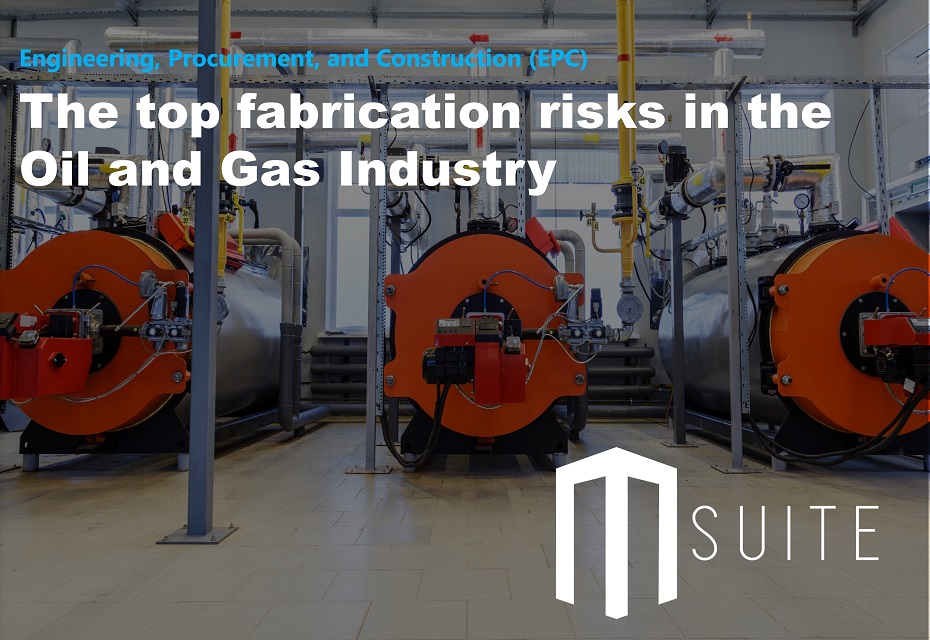The Oil and Gas industry is a complex and unique market that currently fuels the world. Each step in the supply chain brings unique challenges, from the high temperatures and pressures in wells to handling corrosive chemicals during the refining process.
Engineering, Procurement, and Construction (EPC) is a contract-based project delivery model where Oil and Gas companies rely on “EPC contractors” for long-term, large-scale projects that require skilled labor and fine-tuned project management.
EPC contractors providing fabrication work for the Oil and Gas industry are moving to digitize their fabrication shops to overcome and meet the growing and evolving economic, regulatory, and environmental challenges facing the Oil & Gas industry.
The Importance of Fabrication in the Oil & Gas Industry
Fabrication, particularly modular fabrication, and process skids, enables EPC contractors and oil and gas companies to meet their equipment and pipeline needs by quickly and efficiently delivering the products and services necessary to continue operating. Specifically, modular fabrication offers many advantages to the industry, including:
- Increasing the Speed of Construction – Time spent waiting for new plants to be built and parts and equipment delivered is a high cost inconvenience to Oil and Gas companies. Fortunately, modular fabrication enables rapid construction and fast delivery since the process is optimized for maximum speed and efficiency.
- Easier Delivery & Installs – Designing and building new equipment is part of the battle then contractors must deliver products to be set up and installed. Modular fabricated products are efficiently fabricated offsite, stored, shipped, then installed conveniently on the jobsite.
- Increased Quality Standards & Higher Safety – Modular fabrication can be done to the highest level of OSHA safety and quality standards because the equipment and parts are tested before being shipped to the jobsite. This process identifies defects to be corrected before the Oil or Gas company potentially faces labor downtimes or safety hazards from faulty equipment.
- Higher Cost-Effectiveness – The process of modular fabrication is very cost-effective as it eliminates many inefficiencies in traditional on-site construction techniques and avoids risks caused by poor weather and other environmental factors. Performing work off-site in controlled environments also mitigates worker safety issues on-site that can delay projects.
The Top Material Fabrication Risks for Oil and Gas Industry
Oil and Gas facilities are created under high scrutiny to meet several challenges. Three significant risks include Extreme Environments, Reliability, and Safety. Therefore, manufacturers and fabrication shops need to excel at risk mitigation.
- Extreme Environments mean equipment needs to operate in harsh environmental conditions, including corrosive chemicals (e.g., hydrogen), abrasive media (e.g., grit, sand, etc.), and high temperature and pressures (e.g., downhole equipment at tens of thousands of PSI or heat index in the hundreds of degrees). Under these conditions, Oil and Gas components have a minimal margin for error, and manufacturers offer various stainless steel, aluminum, and exotic alloys to withstand extreme operating environments and extend equipment life to ensure satisfactory performance.
- Reliability is a significant risk as Oil & Gas companies can’t afford downtime, so fabricated equipment needs to be reliable or potentially risk disrupting the supply chain. In addition, when a part failure can cost millions of dollars in lost production, the quality of custom components made in the fabrication shop must meet the highest of thresholds with repeated checks and balances. Unfortunately, the current way of relying on paperwork for managing quality control is antiquated. Another risk involves planned equipment maintenance that can interrupt production; therefore, equipment, such as vessels, must be dependable to minimize failure risks, causing unexpected delays and costs.
- Worker Safety is another significant risk due to hazardous conditions on-site, leading to poor fabrication. Poorly fabricated parts can lead to leaks or line bursts, rotating wellhead errors, and exposure to uncontrolled mechanical, hydraulic, electrical, or other potentially hazardous energy sources. The best way to ensure fabricated products function safely and reliably is to use high-quality parts from a trustworthy machine shop. Safety programs and worker behavior need to be continually evaluated and tested to mitigate safety issues and reduce the rate of injuries and accidents in the industry.
Productivity Technology Designed for EPC Shops
Optimizing Fabrication Shop Floors with Productivity Software.
Fabrication productivity software helps EPC contractors meet the challenges to increase your facility’s visibility, productivity, and accuracy in managing production and materials logistics from drawing approval to shipping. In addition, EPC shops supporting Oil & Gas companies need software to mitigate schedule and material quality control risks by automating production tracking and closeout documents.
MSUITE offers a range of features and benefits to help Fabrication Shops scale their capabilities and services:
Automatic version control and removing paper drawings from on the shop floor when drawings are reissued or placed on hold reduces significant rework and unforeseen costs. Weld Log Automation helps shops get 100% traceability to any weld and digitizing the quality process documentation results in reduced overhead costs and improved tracking. Automated timesheets enable EPCs to maximize profitability and manage labor costs for jobs, packages, and bays.
- Automated real-time status tracking of job, package, iso, or spools from concept to completion keeps the PM, Engineer, and Fab Shop Manager on the same page.
- Leverage your data – MSUITE automatically turns shop floor production and quality control data into actionable insights to improve efficiency and productivity.
- Post Weld Logistics create a one-stop-shop for automatic routing of post-weld processes (e.g., X-Ray, Paint, Coatings, Hydro Testing, etc.).
- Configurable and streamlined workflows connect, automate, and optimize work processes between engineering, project, and fabrication teams.
- MSUITE’s digital automation provides real-time status tracking and accountability to bring breakthrough fabrication logistics for EPC
Conclusion
The Oil & Gas landscape of the industrial boom is continuing to evolve at a frantic pace, and the demands on EPC fabrication shops are increasing the challenges. As a result, EPCs will need to innovate to be up to the challenge of keeping pace and evolving to provide state-of-the-art fabrication and services to the industry.
The exponential growth of Oil and Gas has also extended to the petrochemical and industrial sector, as the abundance of resources brings down costs. These exciting developments offer the country many advantages and may even help shore up the US economy during uncertain economic times. However, the boom has also placed massive demands on the industry’s infrastructure and supply line and requires the rapid construction of pipelines and equipment. At the core of this effort is fabrication technology purpose-built for EPC shops to help them maximize economic and safety benefits and provide superior quality with on-time service delivery. Schedule a Demo today!








